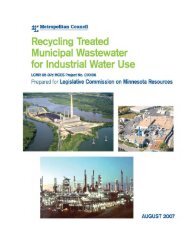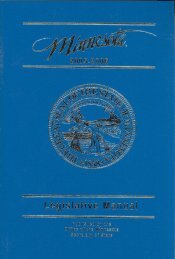Minnesota Board of Pharmacy - Minnesota State Legislature
Minnesota Board of Pharmacy - Minnesota State Legislature
Minnesota Board of Pharmacy - Minnesota State Legislature
You also want an ePaper? Increase the reach of your titles
YUMPU automatically turns print PDFs into web optimized ePapers that Google loves.
<strong>Minnesota</strong> Statutes §151.06, subd. 5 states that the <strong>Board</strong> “may impose a civil penalty not exceeding<br />
$10,000 for each separate violation, the amount <strong>of</strong> the civil penalty to be fixed so as to deprive a<br />
licensee or registrant <strong>of</strong> any economic advantage gained by reason <strong>of</strong> the violation, to discourage<br />
similar violations by the licensee or registrant or any other licensee or registrant, or to reimburse the<br />
board for the cost <strong>of</strong> the investigation and proceeding, including, but not limited to, fees paid for<br />
services provided by the Office <strong>of</strong> Administrative Hearings, legal and investigative services provided<br />
by the Office <strong>of</strong> the Attorney General, court reporters, witnesses, reproduction <strong>of</strong> records, board<br />
members' per diem compensation, board staff time, and travel costs and expenses incurred by board<br />
staff and board members”.<br />
Whether less restrictive or alternative methods <strong>of</strong> performing any function that the agency performs<br />
could adequately protect or provide service to the public<br />
As noted above, the <strong>Board</strong>’s primary functions are: licensing; standard-setting; compliance; provision<br />
<strong>of</strong> technical assistance to elected public <strong>of</strong>ficials, other state agencies, federal agencies and units <strong>of</strong><br />
local government; serving as a resource to the pr<strong>of</strong>ession and the public concerning issues involving<br />
the practice <strong>of</strong> pharmacy, the distribution <strong>of</strong> drugs and the abuse <strong>of</strong> controlled substances;<br />
administering the state’s Prescription Monitoring Program (PMP) and general administration <strong>of</strong> the<br />
agency. Of these functions, only licensing, compliance and administration <strong>of</strong> the PMP might be<br />
considered “restrictive”. Those three areas are addressed below. The <strong>Board</strong> has an open approach to<br />
standard-setting which involves working cooperatively with educational institutions, pr<strong>of</strong>essional<br />
associations, other state agencies, federal agencies, accreditation organizations and other interested<br />
parties. Likewise, the general administration <strong>of</strong> the agency and the provision <strong>of</strong> technical assistance to<br />
elected public <strong>of</strong>ficials, other government agencies, the pr<strong>of</strong>ession and the public are in no way<br />
restrictive.<br />
Licensing<br />
The <strong>Board</strong> licenses pharmacists, pharmacies, drug manufacturers, drug wholesalers, medical gas<br />
manufacturers, and medical gas wholesalers and distributors. In the <strong>Board</strong>’s judgment, less restrictive<br />
alternatives would not adequately protect the public. As mentioned above, there are at least 1.5 million<br />
preventable adverse drug events that occur in the United <strong>State</strong>s each year, many <strong>of</strong> which are<br />
attributable to the dispensing <strong>of</strong> drugs by pharmacists. In addition, it is critical for the health and safety<br />
<strong>of</strong> the public that drugs and medical gases be properly manufactured, stored and distributed. Licensing<br />
helps to ensure that only properly trained and qualified individuals will either practice pharmacy or be<br />
responsible for the operation <strong>of</strong> pharmacies, manufacturers and wholesalers.<br />
Three possible alternatives to licensure are registration, certification and the caveat emptor approach <strong>of</strong><br />
no regulation at all. Every developed country on the planet has rejected the third approach. Each <strong>of</strong> the<br />
states in this country, plus the United <strong>State</strong>s territories <strong>of</strong> Puerto Rico, the Virgin Islands and Guam,<br />
have boards <strong>of</strong> pharmacies that are members <strong>of</strong> the National Association <strong>of</strong> <strong>Board</strong>s <strong>of</strong> <strong>Pharmacy</strong>. In<br />
addition, the pharmacy regulatory agencies <strong>of</strong> eight <strong>of</strong> the Canadian provinces and <strong>of</strong> Australia and<br />
New Zealand are associate members <strong>of</strong> NABP. All <strong>of</strong> the states in this country require pharmacists and<br />
pharmacies to be licensed. Most <strong>of</strong> the states license or register drug manufacturers and all <strong>of</strong> them<br />
license drug wholesalers. Most <strong>of</strong> the states conduct routine, unannounced inspections <strong>of</strong> the facilities<br />
that are licensed.<br />
Registration, in its purest form, provides only for a mechanism by which the registrants can be tracked.<br />
28

















